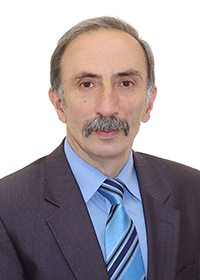
|
Ruben Atoyan PhD
Cartographer, painter; Born in Vanadzor, Armenia, graduate (1976) of the Moscow University of Geodesy and Cartography (Московский государственный университет геодезии и картографии). As a cartographer he worked successively in Tbilisi and Yerevan (since 1979), then he ran the department at the Armenian National Institute of Engineering and Geodesic Research, in 1982-1983 he was a lecturer at Yerevan State University; in 1989 he received his doctorate in technical sciences based on his dissertation entitled Improving Methods and Technologies of Creating Tourist Maps and Developing New Types of Maps; since 1990 he has been living in Minsk, Belarus, where he was an editor at the Belarusian Cartographic-Geodetic Enterprise from 1990-1994; author and co-author of more than one-hundred-and-thirty maps and reference, thematic and tourist atlases, as well as more than seventy theoretical articles on cartography and popular science in the field of geography and culture; he has developed ten innovations and adaptations together with rationalisation proposals, and about one-hundred original artistic and cartographic creations, including panoramic maps of regions (Armenia, Arkhush, Sicily, Cyprus, Crimea, Belarus), cities (incl. Yerevan, Moscow, St. Petersburg, Minsk, Kyiv, Vilnius, Warsaw, Berlin, Kraków, Venice, the Vatican City, Jerusalem, Lviv, Zurich, Bern, Larnaca), historical complexes (Angkor Wat in Cambodia, castles of Belarus, Lithuania, Poland) and spas (Ukraine and Bulgaria); he has participated in collective cartographic exhibitions, including one dedicated to the 1,700th Anniversary of the adoption of Christianity in Armenia (Yerevan, 2001), he has exhibited his own work (Minsk, 2010) and he has exhibited at international exhibitions organised within the framework of the 20th and 21st International Cartographic Conferences (Beijing, 2001, Durban, 2003), where he won awards for his panoramic maps of Venice and Berlin.
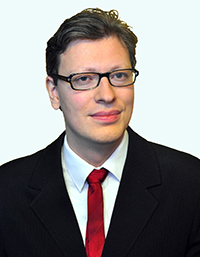 |
Andrzej Gliński PhD
Historian specialising in the history of Armenian self-government on the Polish territories in the modern era; a graduate of Wrocław University; awarded a doctoral degree for a thesis entitled Armenian self-government in Stanisławów 1650-1800: organisation, economy and the everyday; author of academic articles and of pieces popularising his field; president of the board of a scholarly association known as Instytut Grzegorza Piramowicza (Grzegorz Piramowicz Institute); on the editorial board of the Monuments of the history of the Polish Armenians series; academic associate of the Foundation for the Culture and Heritage of Polish Armenians in Warsaw; Dr Gliński is also interested in the geopolitics of the Caucasus and the Middle East.
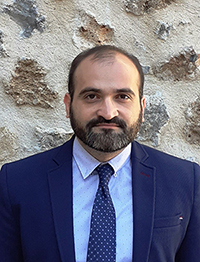 |
Gevorg Kazaryan PhD
Theologian; he comes from Yerevan; he received his education at the State University of Tver (Тверской государственный университетет) in 1999-2001 and at the Gevorkian Theological Seminar (Գևորգյան Հոգևոր Ճեմարան) in Echmiadzin, where he received his master’s degree in 2007 based on a thesis entitled Liturgical Vestments of the Armenian Church: History and Symbolism, written under the direction of Prof. Olga Vardazatyan; he then studied at the National and Kapodistrian University of Athens (Εθνικόν και Καποδιστριακόν Πανεπιστήμιον Αθηνών), where he received a further master’s degree at the Faculty of Theology in 2017 based on a thesis entitled Patriarch Phocius and the Armenian Church: Analysis of a Letter to Zachariah, Catholicos of the Armenian Church, written under the direction of Prof. Ioannis Panagiotopoulos; he is currently preparing a doctoral thesis on the relationship between the Churches of Byzantium and Armenia in the tenth century and eleventh century; since 2019, he has been a lecturer in Classical Armenian at the Research Laboratory in Eastern Christianity, at the National and Kapodistrian University; he also cooperates with the research project Historical Monuments of the Polish Armenians.
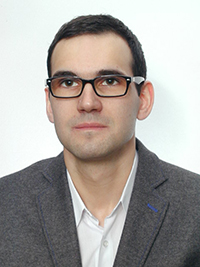 |
Tomasz Krzyżowski PhD
Dr Krzyżowski is a historian specializing in the history of the Armenian Church in the nineteenth and twentieth centuries. He read the history of Eastern Europe for his master’s degree and then took a post-graduate diploma in archive and library science. He pursued his doctoral studies (2018) at the Faculty of History and Cultural Heritage in the John Paul II Pontifical University in Kraków and taught there in 2018-2019. He has collaborated on research projects and contributed to academic conferences on the history of the Polish Armenians, the Catholic Church in Eastern Europe, the south-eastern borderlands of Poland and archival collections in Lviv. He is an editorial assistant of the “Lehahayer” journal. Furthermore, he is part of the editorial team for the Pomniki dziejowe Ormian polskich (Monuments of the history of the Polish Armenians) series and a member of the Polish Society for Oral History and of the Armenian Cultural Society. He is the author of editions of source materials and of more than a dozen articles, which include Zarys historii diecezji odesko-symferopolskiej (Outline of the history of the Odessa-Simferopol diocese, 2011, co-author); Ksiądz profesor Mieczysław Tarnawski (1886-1928): historyk, wychowawca, patriota (Rev. Professor Mieczysław Tarnawski (1886-1928): historian, educator, patriot, 2012), Archidiecezja lwowska obrządku ormiańskokatolickiego w latach 1902-1938 (The Lviv Archdiocese of the Armenian-Catholic Rite in 1902-1938, 2020).
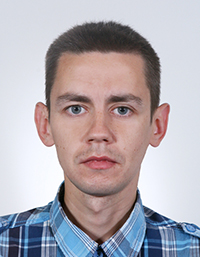 |
|
|
Marcin Łukasz Majewski PhD
Dr Majewski is a historian who writes about the history of towns, the middling sort, and ethnic relations, in the Polish lands from the early-modern period to the twentieth century. He graduated in 2012 from the Faculty of Historical and Social Sciences at Cardinal Stefan Wyszyński University in Warsaw and defended his doctorate, which was based on the dissertation Parafia prawosławna pw. Wszystkich Świętych z siedzibą w Piotrkowie Trybunalskim w latach 1788-1939 (The All Saints’ Orthodox Parish of Piotrków Trybunalski in 1788-1939), in 2018 in the Faculty of Humanities of the John Paul II Catholic University of Lublin. Dr Majewski has written several articles and monographs, including Wołyń: komunizm, nacjonalizm, terroryzm. Wojewoda wołyński wobec ukraińskich organizacji terrorystycznych na Wołyniu 1928-1938 (Volhynia: communism, nationalism, terrorism. The Volhynia regional governor with respect to Ukrainian terrorist organizations in Volhynia in 1928-1938, 2014), Węgrzy, Szkoci i Ormianie. Studia nad składem etnicznym mieszkańców Piotrkowa przyjętych do prawa miejskiego w okresie staropolskim (Hungarians, Scots and Armenians: studies of the ethnic composition of Piotrków residents granted town rights in the Old Polish period, 2017) and Piotrków ormiański. Przewodnik (A Guide to Armenian Piotrków, 2019). Dr Majewski has been a winner in the author’s category of the KLIO prize awarded by the Association of History Book Publishers. Furthermore, he serves as a member of the editorial team of the series of source documents Pomniki dziejowe Ormian polskich (Monuments of the history of the Polish Armenians), and has worked as a research associate with the Foundation for the Culture and Heritage of Polish Armenians in Warsaw.
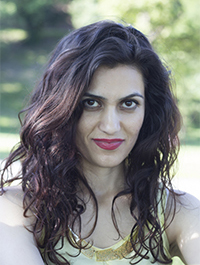 |
Hripsime Mamikonyan PhD
Master of foreign languages (degree awarded in Yerevan); translator into and out of Armenian, English, Polish and Russian; doctoral student in the history department of the Jagiellonian University in Kraków; studies the seventeenth-century history of the Polish Armenians; her doctoral thesis addresses the life and achievements of Simeon Lehatsi, a seventeenth-century Armenian intellectual of Zamość; she is associated with the journals “Lehahayer” and “Awedis”, as well as with “Biuletyn Ormiańskiego Towarzystwa Kulturalnego” (Bulletin of the Armenian Cultural Association); she has written several learned articles, including Simeon Lehatsi: a 17th Century Traveler Against the Background of his Times (Rassegna degli Armenisti Italiani; Italian Armenists’ Review); she also works as part of the team engaged in the Monuments of the history of the Polish Armenians research project conducted by the Foundation for the Culture and Heritage of Polish Armenians in Warsaw.
fot. Milena J. Kalczyńska
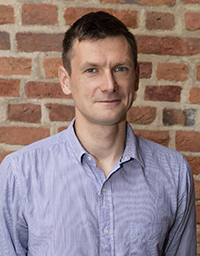 |
Jakub Osiecki PhD
Dr Osiecki is a historian who devotes his attention to the history of Armenia and the Armenian Church in the twentieth century. As an undergraduate, he specialised in Russian Studies at the Jagiellonian University. He then moved to the Faculty of History and Cultural Heritage at the Pontifical Academy of Theology in Kraków to complete his doctorate (2008-2015), during which he was a visiting scholar at the Institute of Archaeology and Ethnology of the Academy of Sciences of the Republic of Armenia (2011-2013). He has held grants from the National Science Centre, the Gulbenkian Foundation, the Visegrad Fund and the Polish Academy of Arts and Sciences. Furthermore, he is secretary of the Armenian Cultural Society in Krakow and a member of both the International Association of Armenian Studies and the Society for Armenian Studies. He has written many scholarly publications, including the following books: Apostolski Kościół Ormiański w Armenii sowieckiej w latach 1920-1932 (The Apostolic Armenian Church in Soviet Armenia in 1920-1932, 2017) and (with K. Stopka and K. Siekierski) Ormianie katolicy w Armenii i Gruzji. Historia, pamięć, tożsamość (Catholic Armenians in Armenia and Georgia: history, memory, identity, 2015).
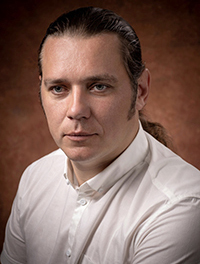 |
Maksym Potapenko PhD
Historian specialising in Polish-Ukrainian relations on the cusp of the nineteenth and twentieth centuries and in the ethnic history of Ukraine; author of studies of Poles in Ukraine and Polish Armenians in Mohylów Podolski (Mohyliv Podilskyi) in the eighteenth and nineteenth centuries; lecturer in the department of history at the Nizhyn Mykola Gogol State University (Ніжинський державний університет ім. М. В. Гоголя, Ukraine); member of the Polish-Ukrainian Commission for the Investigation of Mutual Relations in the years 1917-1921 convened jointly by Warsaw University and the National University of Kyiv-Mohyla Academy (Національний університет «Києво-Могилянська академія», Ukraine); he also works as part of the team engaged in the Monuments of the history of the Polish Armenians research project conducted by the Foundation for the Culture and Heritage of Polish Armenians in Warsaw.
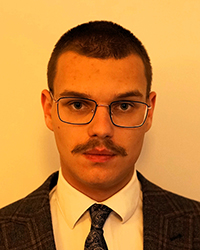 |
Mikołaj Walkowicz
Student of history and turkology at the Jagiellonian University in Cracow and trainee at the Research Centre for Armenian Culture since 2023; as a member of the editorial team of the source series Monuments of the History of Polish Armenians he also cooperates with the Foundation of Culture and Heritage of Polish Armenians in Warsaw; he is interested in the issues of commercial activity of Armenians in the 16th and 17th centuries, as well as the structure of the treasury and tax apparatus of the Kingdom of Poland.
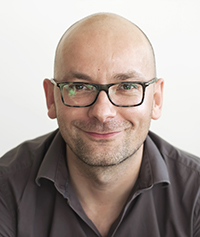 |
Franciszek Wasyl PhD
Dr Franciszek Wasyl, who is a graduate of the university of Rzeszów (2005) and who earned his doctorate in Kraków at the Jagiellonian University (2012), is a historian specializing in demography. He completed post-graduate courses in museum studies at the same university (2009), with which he was professionally associated as an archivist in 2007-2015. He served as a member of the committee of the Kraków branch of the Association of Polish Archivists in 2008-2012. From 2015-2017, when he held a grant from the National Science Centre to study the social history of the town of Kuty on the Cheremosz river, Dr Wasyl was a research and teaching associate in the Tadeusz Taube Chair of Jewish Studies at the University of Wrocław. Dr Wasyl is furthermore a member of the editorial team of the series of source documents Pomniki dziejowe Ormian polskich (Monuments of the history of the Polish Armenians] and has been awarded scholarships from the National Humanities Development Programme, the Michalski Foundation and the Lanckoroński Foundation. He has collaborated in an academic capacity with the Foundation for the Culture and Heritage of Polish Armenians in Warsaw and with the Piramowicz Institute in Wrocław. He is the author of several academic articles and monographs, and of several pieces popularising his field, including Ormianie w przedautonomicznej Galicji. Studium demograficzno-historyczne (The Armenians in pre-autonomy Galicia: a demographic and historical study, 2015) and Sąsiedzi. Historia istnienia wieloetnicznej wspólnoty (Neighbours: history of the existence of a multi-ethnic Community, 2018).

